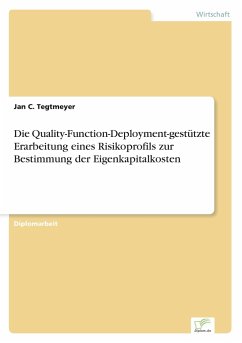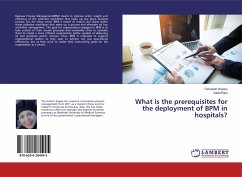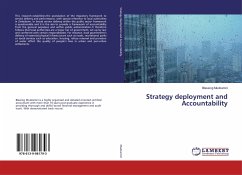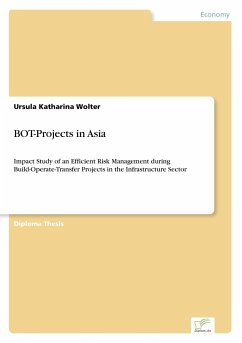
Global Deployment
An examination of causes for undesirably high employee turnover after the foreign assignment
Versandkostenfrei!
Versandfertig in 1-2 Wochen
68,00 €
inkl. MwSt.

PAYBACK Punkte
0 °P sammeln!
Diploma Thesis from the year 2002 in the subject Business economics - Personnel and Organisation, grade: 1,5, Furtwangen University (Internationale Betriebswirtschaft), language: English, abstract: Inhaltsangabe:Abstract:This thesis has been written in cooperation with the human resource department of a top business consultant. The Global Deployment country manager worried about a higher turnover rate among employees back from foreign assignments (former expatriates) than the average employee fluctuation in the company.Cross company research indicates that an average 25 % percent of repatriate...
Diploma Thesis from the year 2002 in the subject Business economics - Personnel and Organisation, grade: 1,5, Furtwangen University (Internationale Betriebswirtschaft), language: English, abstract: Inhaltsangabe:Abstract:
This thesis has been written in cooperation with the human resource department of a top business consultant. The Global Deployment country manager worried about a higher turnover rate among employees back from foreign assignments (former expatriates) than the average employee fluctuation in the company.
Cross company research indicates that an average 25 % percent of repatriates leave their company in the year following repatriation and up to 50% in a period of three years.
This thesis has two main goals:
1. Finding out possible reasons for high turnover after repatriation
2. Identify measures likely to lower turnover after repatriation
In order to achieve this, foreign assignments are first placed in the context of the employee. The main question here is what happens to the employee in the process of the foreign assignment (pre-departure to re-entry) and how he possibly manages it.
This covers diverse aspects from cultural problems to financial aspects as well as the employees expectations. (See detail in summary, Part C)
The second step is to place foreign assignments in the context of the company. Why foreign assignments, what are its benefits and disadvantages. Do companies really take advantage of the full potential of their repatriates? How do most companies handle their foreign assignments? (See detail in summary, Part D)
Having defined the whole range of causes for high turnover, the last part of the thesis suggests a strategic approach to foreign assignments and measures to lower turnover after repatriation. (See detail in summary Part E)
Finally, a very valuable four pages questionnaire is provided. It was developed together with the business consultant and the academic supervisor, who is a specialist and freelance consultant in matters of intercultural management. In line with the thesis, the questionnaire aims to measure returning expatriates satisfaction level, identify possible reasons and solutions for high turnover after repatriation.
Inhaltsverzeichnis:Table of Contents:
A.INTRODUCTION1
B.GOALS AND IMPLICATIONS OF THE THESIS4
1.DEFINITION OF GOALS5
2.IMPLICATIONS OF THE TOPIC5
C.GLOBAL DEPLOYMENT FROM THE EMPLOYEE'S PERSPECTIVE8
1.PRE-DEPARTURE10
1.1INITIAL MOTIVATION OF THE EMPLOYEE10
1.2SPOUSE MOTIVATION11
2.WHILE ABROAD12
2.1CULTURE SHOCK - FACING THE UNKNOWN12
2.2ADJUSTMENT - TAMING THE UNKNOWN14
2.2.1Concept of adjustment14
2.2.2Factors influencing adjustment16
2.2.3Summary of factors influencing adjustment18
2.3CHANGES IN SOCIAL STATUS AND LIFESTYLE18
2.4INCREASED JOB AUTONOMY & RESPONSIBILITIES19
2.5THE OUT-OF-SIGHT, OUT-OF-MIND SYNDROME19
3.PRE-RETURN (EXPECTATIONS)20
3.1THE IDEAL HOME20
3.2EXPECTING A HERO'S WELCOME AND PROFESSIONAL PROMOTION20
3.3SUMMARIZED SITUATION BEFORE RETURN21
4.BACK HOME - REPATRIATION22
4.1CHANGES IN THE HOME ENVIRONMENT22
4.2THE REVERSE CULTURE SHOCK CYCLE23
4.2.1Honeymoon23
4.2.2Culture shock & Adjustment24
4.3FACTORS INFLUENCING THE EMPLOYEE AND HIS ADJUSTMENT BACK HOME26
4.3.1Expectations about home26
4.3.2The experience abroad26
4.3.3Job factors26
4.3.4Social factors29
4.3.5Financial factors29
4.4SUMMARIZEDSITUATION UPON RETURN29
5.SUMMARIZED REASONS FOR TURNOVER AFTER REPATRIATION30
D.FOREIGN ASSIGNMENTS FROM THE CORPORATE PERSPECTIVE31
1.OBJECTIVES OF FOREIGN ASSIGNMENTS FOR COMPANIES32
1.1OPERATIVE ASSIGNMENTS32
1.2STRATEGIC ASSIGNMENTS33
1.2.1Generation of knowledge and development of global managers33
1.2.2Tran...
This thesis has been written in cooperation with the human resource department of a top business consultant. The Global Deployment country manager worried about a higher turnover rate among employees back from foreign assignments (former expatriates) than the average employee fluctuation in the company.
Cross company research indicates that an average 25 % percent of repatriates leave their company in the year following repatriation and up to 50% in a period of three years.
This thesis has two main goals:
1. Finding out possible reasons for high turnover after repatriation
2. Identify measures likely to lower turnover after repatriation
In order to achieve this, foreign assignments are first placed in the context of the employee. The main question here is what happens to the employee in the process of the foreign assignment (pre-departure to re-entry) and how he possibly manages it.
This covers diverse aspects from cultural problems to financial aspects as well as the employees expectations. (See detail in summary, Part C)
The second step is to place foreign assignments in the context of the company. Why foreign assignments, what are its benefits and disadvantages. Do companies really take advantage of the full potential of their repatriates? How do most companies handle their foreign assignments? (See detail in summary, Part D)
Having defined the whole range of causes for high turnover, the last part of the thesis suggests a strategic approach to foreign assignments and measures to lower turnover after repatriation. (See detail in summary Part E)
Finally, a very valuable four pages questionnaire is provided. It was developed together with the business consultant and the academic supervisor, who is a specialist and freelance consultant in matters of intercultural management. In line with the thesis, the questionnaire aims to measure returning expatriates satisfaction level, identify possible reasons and solutions for high turnover after repatriation.
Inhaltsverzeichnis:Table of Contents:
A.INTRODUCTION1
B.GOALS AND IMPLICATIONS OF THE THESIS4
1.DEFINITION OF GOALS5
2.IMPLICATIONS OF THE TOPIC5
C.GLOBAL DEPLOYMENT FROM THE EMPLOYEE'S PERSPECTIVE8
1.PRE-DEPARTURE10
1.1INITIAL MOTIVATION OF THE EMPLOYEE10
1.2SPOUSE MOTIVATION11
2.WHILE ABROAD12
2.1CULTURE SHOCK - FACING THE UNKNOWN12
2.2ADJUSTMENT - TAMING THE UNKNOWN14
2.2.1Concept of adjustment14
2.2.2Factors influencing adjustment16
2.2.3Summary of factors influencing adjustment18
2.3CHANGES IN SOCIAL STATUS AND LIFESTYLE18
2.4INCREASED JOB AUTONOMY & RESPONSIBILITIES19
2.5THE OUT-OF-SIGHT, OUT-OF-MIND SYNDROME19
3.PRE-RETURN (EXPECTATIONS)20
3.1THE IDEAL HOME20
3.2EXPECTING A HERO'S WELCOME AND PROFESSIONAL PROMOTION20
3.3SUMMARIZED SITUATION BEFORE RETURN21
4.BACK HOME - REPATRIATION22
4.1CHANGES IN THE HOME ENVIRONMENT22
4.2THE REVERSE CULTURE SHOCK CYCLE23
4.2.1Honeymoon23
4.2.2Culture shock & Adjustment24
4.3FACTORS INFLUENCING THE EMPLOYEE AND HIS ADJUSTMENT BACK HOME26
4.3.1Expectations about home26
4.3.2The experience abroad26
4.3.3Job factors26
4.3.4Social factors29
4.3.5Financial factors29
4.4SUMMARIZEDSITUATION UPON RETURN29
5.SUMMARIZED REASONS FOR TURNOVER AFTER REPATRIATION30
D.FOREIGN ASSIGNMENTS FROM THE CORPORATE PERSPECTIVE31
1.OBJECTIVES OF FOREIGN ASSIGNMENTS FOR COMPANIES32
1.1OPERATIVE ASSIGNMENTS32
1.2STRATEGIC ASSIGNMENTS33
1.2.1Generation of knowledge and development of global managers33
1.2.2Tran...














